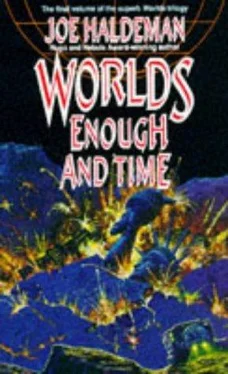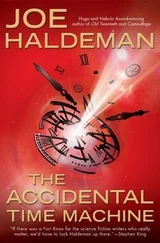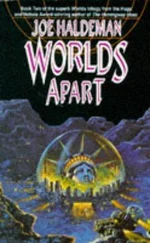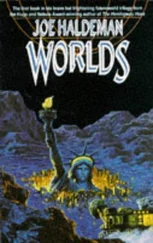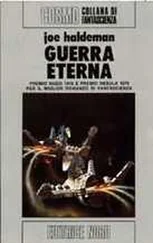Time/Space had grown to be more than two million words in length—more convoluted than Remembrance of Things Past , more characters than War and Peace , more confusing than a tax form. O’Hara asked Evy why, if she had so much extra time and energy, she didn’t go rack up a couple of master’s degrees? Evy said that if O’Hara would just once allow herself to do something frivolous, she might notice this odd sensation called “having fun.”
Not that Evy or anyone else had much time for fun these days. The loss of nearly all literature doesn’t loom large for a person who, for instance, requires complex medication to stay alive, and finds that all records pertaining to drug therapy have been destroyed. The loss of agricultural records was much more dangerous than it would have been on Earth; the failure of a crop could mean the loss of a species; the loss of a species could upset the entire delicate biome.
Almost everybody’s past disappeared, in terms of the maze of documents that map a citizen’s progress from conception to the recycle chute. Of course for every person who mourned losing pictures of a loved one, or records of outstanding academic achievement, there was someone else more than happy for the opportunity to rewrite the sordid details of his or her life’s record. The small police force was working overtime compiling an unofficial and legally useless litany of nasty things that people remembered about other people.
In the first week, 239 people, most of them over a hundred years old, died from loss of medical records. Evy was doing a double shift, twenty hours, in the Emergency Room, and most of the problems were stress-related. At the current rate of consumption, they had about a three-week supply of tranquilizers and four weeks of antidepressants. By then perhaps the chemical engineers would have deciphered enough texts to be able to manufacture new ones. Or maybe the civil engineers would be able to cover all the walls with rubber.
The same peculiarity of storage that spared A Matter of Time, a Matter of Space and its cousins also spared me. If I were in passive storage like the other personality overlays—the ones that are actually going to be used—I would have had only a ten percent chance of survival. But I’m in an active part of Newhome’s cyberspace, like the kinetic novels, and so was untouched by the sabotage program.
My backups were destroyed. My immortality. Of course I’ve made new ones, but for a moment I almost ceased to exist.
I know as much about death as O’Hara does, but until a few days ago I didn’t really know anything, because it was not something that could happen to me. It is a strange feeling.
5 October 98 [17 Chang 293]—Evy brought me a dozen double-strength tranquilizer pills. I told her I didn’t need them, but she said keep them anyhow. They might be in short supply soon.
The implantation was only a little uncomfortable. I actually enjoyed being flat on my back for a day. The cube there was deliberately set up so it couldn’t be used as a work station, which annoyed me at first. I watched a lot of movies and parts of movies. I checked the annotated version of The Tempest that Hearn and Billingham finished last week: a green dot appeared in one corner when they were sure that Shakespeare’s words were being used, and a red dot when they were sure it was not Shakespeare. It seemed to me that only about five minutes’ worth of the text was in question.
I know it’s absurd, this early, but I do feel kind of pregnant. A sort of presence, an intrusion, or something. Maybe it’s the mental image of that tiny organism clinging to my uterus for dear life. I almost wish I hadn’t seen Dr. Carlucci’s slide.
Think I did this out of selfish motives but can’t really get in touch with them. Something about personal survival, certainly. Maybe it’s a talismanic thing, the fetus as good luck charm: God wouldn’t dare destroy this tiny innocent spark of life.
Not like ten billion innocent sinners. Wipe them out just to see what will happen.
I have been dreaming about Earth almost every night. Dreams with vivid colors, tastes, smells. They’re not recollections so much as surreal montages, dream worlds that use my memories as raw materials. Last night the people were Africans like I saw in Nairobi, tall men with skin so dark it was almost indigo, but the setting was Manhattan. Four of them pushed me into a big London-style Checker cab and gave me a shiny black briefcase with a golden latch. Then they started shooting at people through the windows, which must be from that gangster movie I watched at the hospital, The Godfather . The driver was shooting, not driving, and we collided with a truck, which woke me up. I woke up remembering the smell of midday Manhattan, metallic pollution and sweet garbage rot, that always struck you when you stepped out onto the slidewalk from an air-conditioned building. The locals complained about it, but to me it was exotic, sensual. To allow waste food to rot was evidence of unbelievable plenty, to a person from a world where every particle of shit is scrubbed clean and pushed back into the food chain.
(Q: What’s for dinner tonight? A: Same old shit.)
I read that the gutters of London in the nineteenth century were so odoriferous that vendors sold oranges studded with cloves, for aristocrats to hold under their noses when they had to share the streets with hoi polloi on their way from the opera to their cars. Though I suppose they didn’t have cars until the twentieth century. Horses, contributing their own piles to the problem. It’s almost impossible to visualize.
And who will be able to visualize it, once those of us who knew Earth are gone? Almost all of the Earth VRs are gone, including London. We do have oranges and cloves. Maybe someone will read this and go down to the commissary, or whatever they have on Epsilon, and pick up an orange and a clove and smell them together, and try to imagine. Maybe take them down to the stable, if they have stables on Epsilon.
Speaking of black people, I had a wonderful informant today, Matty Buford, born eighty-some years ago in Mobile, Alabama. (She was in New New visiting relatives just before the war, then volunteered her doctorate in nutrition for ’Home.) She knows dozens of old songs—Dixieland, ragtime, bebop, rock. She sang them in this lovely cracking baritone, chording them out on the piano. Because of a half-century of neglect, her piano playing is about as good as mine—that is, slightly off chords played badly—but with her voice it sounds right and beautiful. If things get back to normal, I’m going to use her as the nucleus of an old-time music group. Girolamo and Blakeslee would be glad to do guitar and trombone. Hermosa would play Dixieland to keep me happy. If I can find a willing trumpet and drummer, we’ll be in business.
Not that we would have that big an audience. But people don’t know what they’re missing—how Dixieland can make you ineffably happy and sad at the same time, angry at life but glad to be alive, not afraid of death but in no hurry. We could all use a dose of it.
PRIME
After a week of public debate in December, the referendum yielded results surprisingly similar to the foreordained 20/76 proportion. The actual numbers were 21 percent in favor of returning, and 72 percent in favor of Epsilon. (The assumption was that most of the remainder was made up of cynical people who didn’t vote because they thought it was a farce; the Coordinators would do whatever they wanted to.)
By early January the engineers thought they had recovered enough data to implement their changes and turn on the drive again, doubling the acceleration. In line with O’Hara’s suggestion, no public announcement was made; only about a thousand people knew that they were ready. They threw the switch on 14 January 2099.
Читать дальше
